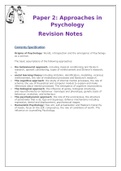Paper 2: Approaches in
Psychology
Revision Notes
Contents/Specification
Origins of Psychology: Wundt, introspection and the emergence of Psychology
as a science.
The basic assumptions of the following approaches:
the behaviourist approach, including classical conditioning and Pavlov’s
research, operant conditioning, types of reinforcement and Skinner’s research;
ii)
social learning theory including imitation, identification, modelling, vicarious
reinforcement, the role of mediational processes and Bandura’s research.
The cognitive approach: the study of internal mental processes, the role of
schema, the use of theoretical and computer models to explain and make
inferences about mental processes. The emergence of cognitive neuroscience.
The biological approach: the influence of genes, biological structures,
and neurochemistry on behaviour. Genotype and phenotype, genetic basis of
behaviour, evolution, and behaviour.
The psychodynamic approach: the role of the unconscious, the structure
of personality that is Id, Ego and Superego, defence mechanisms including
repression, denial and displacement, psychosexual stages.
Humanistic Psychology: free will, self-actualisation and Maslow’s hierarchy
of needs, focus on the self, congruence, the role of conditions of worth. The
influence on counselling Psychology.
, Origins of Psychology-Wundt & Introspection
Wundt (1832-1920) ‘Father of psychology’, believed all aspects of nature including the mind
could be studied scientifically. He paved the way for psychology's acceptance as a science, in
his lab in Leipzig Germany Wundt studied aspects of behaviour that could be strictly
controlled under experimental condition.
Introspection
Wundt believed his aim to study the structure of the human mind would be most accomplishable by
breaking down behaviours into sensation/perception and into basic elements (structuralism) in a
technique called introspection.
This is the process in where someone gains knowledge about their mental/emotional state once
examining or observing their conscious thoughts and feelings. Wundt claimed that with sufficient
training, mental processes such as memory and perception could be observed as they occurred
using introspection. This works by showing someone a controlled stimulus e.g. visual image or audio
data, then they would provide a description of their inner processes/thoughts and then Wundt could
compare different participants report to the stimulus and establish general theories and conclusions.
emergence of psychology as a science
Introspection led to the emergence of psychology as a science, when its scientific credibility was
questioned by early behaviourists. They assumed that all behaviour will have a cause (determinism)
and that behaviours should be possible to predict in different conditions, this led to empirical
(observable) methods being used on human beings. This was paired with the scientific method to
explore empiricism; this was the introduction of objective and systematic methods that were
standardised and so allowed for replicability and tests on reliability, something that introspection
struggled to do. Using these methods meant, formulation, modification and testing of hypothesis
could be carried out.
Evaluation of Wundt
One criticism of Wundts approach is that it relied on non-observable responses as the processes that
participants reported were considered unobservable. They are subjective experiences so there is no
way to validate or dispute them, therefore there is no way to assess the reliability of Wundts
interpretations/conclusions and suggests a lack of falsifiability. This is evident in that introspective
experiment results were not able to be reproduced by other researchers whereas early
behaviourists were already producing replicable results and discovering generalisable principles.
One strength of Wundts introspection is that it's still used within scientific psychology. Evident when
Hunter (2003) used introspection methods as a way of making happiness an observable
explanation. During experiment teenagers had beepers which went off during random times of the
day and asked to report how they felt, most entries indicated the teenagers were unhappy, however
hunter found when their energy was focused on a challenging task, they were actually more upbeat.
Therefore, introspection still has practical application in some contexts today.
A second criticism of Wundts introspection is that it's not an accurate representation of the knowledge
we have on the causes of our behaviour. Nisbett and Wilsons (1977) challenge the value of introspective
reports as they found that participants were highly unaware of factors influence their choice of
consumer. This is a particular issue in the study of suggested attitudes e.g., stereotyping. For example,
someone may be implicitly racist which influences their behaviour towards minority ethnic groups but
because attitudes exist outside of a conscious awareness, introspective reports would not reveal this.
Therefore, the data that introspective reports can give is limited.





